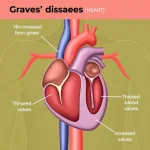Danno d’organo più frequente seguito ipertensione arteriosa
Based on the provided text, there’s no single organ definitively identified as the most frequently damaged by hypertension. Several sources point to different organs depending on the study and criteria used.
However, the following organs are consistently highlighted as being significantly affected:
-
Kidneys: Multiple sources mention kidney disease as a frequent consequence of hypertension. One study [(https://pmc.ncbi.nlm.nih.gov/articles/PMC10569229/) ] specifically states that kidney disease was the most frequent end-organ damage (13.7%) in their sample of hypertensive patients. Another source [(https://www.kidney.org/high-blood-pressure-and-chronic-kidney-disease)] highlights uncontrolled hypertension as a leading cause of kidney failure.
-
Heart: Hypertension is strongly linked to heart disease, including coronary artery disease, angina, arrhythmias, heart failure, and heart attacks [(https://www.mayoclinic.org/diseases-conditions/high-blood-pressure/in-depth/high-blood-pressure/art-20045868), (https://www.heart.org/en/health-topics/high-blood-pressure/health-threats-from-high-blood-pressure)]. Several sources mention the heart as a primary target organ. [(https://pubmed.ncbi.nlm.nih.gov/12119798/), (https://www.nature.com/articles/hr200810)]
-
Brain: The brain is also vulnerable to hypertensive damage, leading to stroke and vascular dementia [(https://academic.oup.com/book/30038/chapter/255830040), (https://pubmed.ncbi.nlm.nih.gov/12119798/)].
-
Arteries: Hypertension directly damages blood vessels, leading to various complications in different organs [(https://www.ahajournals.org/doi/10.1161/HYPERTENSIONAHA.121.18502), (https://pmc.ncbi.nlm.nih.gov/articles/PMC4948792/)]. One study mentions elevated carotid-femoral pulse wave velocity (a marker of arterial damage) as the most prevalent form of hypertension-mediated organ damage (HMOD) in their study [(https://www.ahajournals.org/doi/10.1161/HYPERTENSIONAHA.121.18502)].
-
Retina: Hypertensive retinopathy is also mentioned as a frequent finding [(https://ifcardio.org/pdf/italian-heart-journal/2001/09/20010277.pdf)].
In summary, while kidney disease was the most frequent in one specific study, the heart, brain, and arteries are also severely impacted by hypertension. The most frequent organ damage likely varies depending on the population studied, the duration and severity of hypertension, and the specific methods used to assess organ damage.
Ripeti in italiano
Non esiste un singolo organo che sia inequivocabilmente il più frequentemente danneggiato dall’ipertensione arteriosa. Diversi studi riportano risultati differenti a seconda della popolazione studiata, della durata e gravità dell’ipertensione e dei metodi utilizzati per valutare il danno d’organo. Tuttavia, alcuni organi sono costantemente indicati come significativamente colpiti:
-
Rene: Diverse fonti menzionano la nefropatia (malattia renale) come frequente conseguenza dell’ipertensione. Alcuni studi riportano addirittura la malattia renale come il danno d’organo più frequente nei pazienti ipertesi.
-
Cuore: L’ipertensione è fortemente correlata a malattie cardiache, tra cui cardiopatia coronarica, angina pectoris, aritmie, insufficienza cardiaca e infarto. Il cuore è spesso citato come organo bersaglio primario.
-
Cervello: Il cervello è vulnerabile al danno ipertensivo, che può portare ad ictus e demenza vascolare.
-
Arterie: L’ipertensione danneggia direttamente i vasi sanguigni, causando diverse complicazioni in vari organi. Alcuni studi indicano il danno arterioso come forma prevalente di danno d’organo da ipertensione.
-
Retina: La retinopatia ipertensiva è anch’essa frequentemente riscontrata.
In sintesi, mentre alcuni studi potrebbero evidenziare il rene come organo più frequentemente danneggiato, il cuore, il cervello e le arterie sono anch’essi gravemente colpiti dall’ipertensione. Il danno d’organo più frequente varia probabilmente a seconda dei fattori sopra menzionati.
#chats





